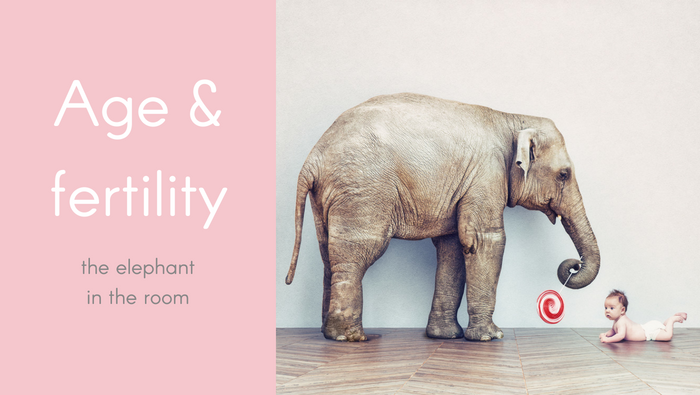Age and fertility is one of the more delicate subjects in my work. The elephant in the room, sometimes.
I work with women and couples to protect and boost fertility.
I’m really passionate about helping people get baby-fit or baby-ready a.k.a preconception care.
Sometimes people come to prepare before trying, but more often, people come because they’re not falling pregnant as quickly as they hoped.
Or they have a challenge that may make falling pregnant more tricky, like PCOS or low sperm count.
Some of them are going through rounds of fertility treatment, which is not an easy option in my opinion.
Some have suffered terrible loss through miscarriage.
All that means I’m working with people who might be struggling physically, mentally and emotionally. They deserve sensitivity, support and space and time. They deserve to be really nurtured, I think.
Sometimes those women and couples are “older” – late 30s and early 40s.
It’s a tricky subject. Of course, I’m sensitive and supportive, but I also have integrity. I choose honesty.
Age and Fertility – Some Stats
Let’s face it more women are having babies later in life.
Take the stats for the England and Wales here in the UK. Between 2013 and 2014 conception rates went up for women aged 25 years and over, and went down for women aged under 25 years.
The biggest increase in conception rates was among women aged 35 to 39.
The conception rate for women aged 40 and over has more than doubled since 1990
And that’s positive for the older couples. I really get that.
The Truth Bombs About Age and Fertility
…is that biological clocks tick. Fertility declines with age. And over 35, it declines more sharply.
Which means – generally – women have better chances of falling pregnant naturally under 35 than over 35. For the first time or when planning add to their families.
In our late 30s and early 40s our hormones and bodies can start to change and that includes changes to our cycles and ovulation. We may not ovulate every month. Our cycles can become shorter.
It’s not menopause, but it’s pre menopause.
So being older does influence fertility.
But here’s the rub, not everyone’s biological clock ticks at the same rate. There’s the average or general “rule” but sadly for some women their egg reserves runs down faster than that average. For others, they stay fertile for longer.
You may be thinking, so what, there’s always fertility treatment anyway?
Age and Fertility Treatments
Of course, fertility treatment is an option for women and couples who are finding it difficult to conceive naturally or who choose donor eggs or sperm. Treatment brings joy to countless couples through the baby of their dreams. I know it. I’ve seen it.
With integrity, I always speak with my clients about fertility treatments. Some of my clients are choosing IVF and other treatments and I work with them towards that.
But I’m honest. Fertility treatments are not known for high success rates. Some clinics report better results than other, sure. And again success rates generally reduce with age.
It’s another truth bomb, but one I always feel should be discussed. I love optimism. There’s a difference between that and false hope.
BUT there is always hope. Because there’s another truth we haven’t talked about.
There are many factors that influence fertility – it’s not all about age. And they influence fertility whether you’re trying naturally or via IVF.
Other Fertility Factors
There are lots of factors that influence fertility:-
- Nutrition: if we’re low in key nutrients, we’ll find it hard to conceive. A varied, nutritious diet is the basis of preconception care.
- Weight: being overweight can lead to excess oestrogen and fertility issues. And being underweight can affect ovulation and chances of falling pregnant.
- Smoking: smoking increases the risk of fertility issues in women.
- Alcohol: drinking alcohol impacts fertility; even low to moderate drinking is thought to affect it.
- Hormonal health issues : conditions that influence ovulation and cycle length can affect fertility like PCOS.
- Other health issues: there are other conditions that interfere with natural fertility e.g. thyroid issues. Speak with your doctor if you have a known condition before trying to fall pregnant.
- GUIs and STIs – worth mentioning on their own. Not all GUIs (genito-urinary infections) are STIs (sexually transmitted infections). Both can affect fertility, pregnancy and babies’ born.
- Drugs and meds: some drugs are known to impact fertility – some antidepressants, antibiotics, painkillers, etc. Check with your doctor before trying to conceive.
- Being exposed to environmental hazards: toxic chemicals, radiation, electromagnetic emissions, heat etc have been shown to interfere with fertility in some studies.
- Stress: stress can mess up your cycle and ovulation, leading to fertility issues.
So What Does This Mean?
All this means, women and couples can protect and boost their health and fertility through diet and lifestyle choices.
To prepare to conceive naturally or via IVF.
Whatever your age.
I guess what I’m saying is that age is ONE factor. NOT one to be ignored. But not to be fixated on either. Be realistic.
And give yourself the very best chance of success – naturally or via treatment – by getting yourself in the best possible health you can. Stack the odds in your favour whatever your situation.
Love,
P.S. If you love my fertility-friendly blogs, you’ll really lurve my FREE, confidential mini online programme called 7 Steps to Boost Fertility. It has ALL the basics to get baby-ready, baby-fit and boost fertility. Whether trying naturally or via IVF.
Super easy to access from a link sent to you e mail. And private – no-one knows you signed up or can see you in there. Watch the videos and read the notes at home. Listen with headphones in – very discreet.
You can dive in at any time.
Grab your place here >>> http://bit.ly/7stepstoboostfertility



Recent Comments